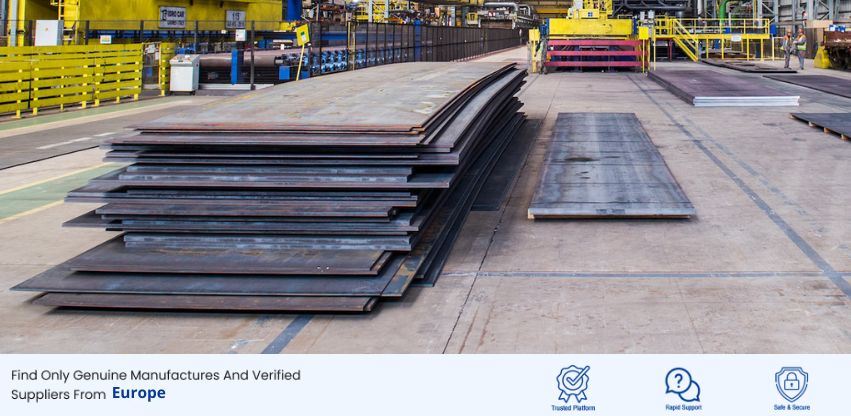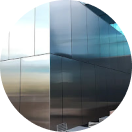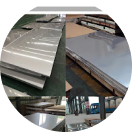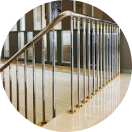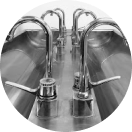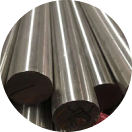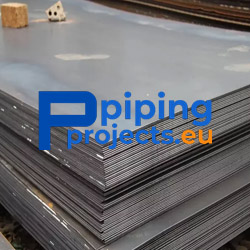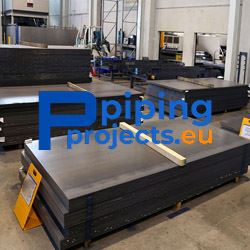Carbon Steel Plate Manufacturers, Suppliers & Exporters in Europe - PipingProjects.eu
PipingProjects.eu is one of the leading Carbon Steel Plate Manufacturer in Europe. We are renowned for supplying top-quality Seamless Carbon Steel Plates. Our Carbon Steel Plates are distinguished by their outstanding high-temperature strength and remarkable corrosion resistance. As a trusted Carbon Steel Plate Supplier in Europe, our steadfast dedication to excellence is evident through our rigorous adherence to industry regulations and standards. Opting for PipingProjects.eu means selecting a dependable supplier for superior Carbon Steel Plates that consistently surpass the most rigorous industry benchmarks.
What is Carbon Steel Plate?
Carbon Steel Plate is a type of steel plate primarily composed of iron and carbon, with other alloying elements in smaller quantities. The carbon content typically ranges from 0.05% to 2.0%, with higher carbon levels leading to increased hardness and strength. Carbon Steel Plates are versatile and widely used in various industries due to their relatively low cost, ease of manufacturing, and excellent mechanical properties.
Carbon Steel Plates can be classified into grades based on their carbon content and alloying elements, such as mild steel (low carbon steel), medium carbon steel, and high carbon steel. The composition and properties of Carbon Steel Plates vary depending on the intended application and desired mechanical characteristics.
Top leading Manufacturing Companies
Where to find reliable Carbon Steel Plate Suppliers in Europe?
PipingProjects.eu is a distinguished Carbon Steel Plate Manufacturer in Europe, renowned for its commitment to delivering top-quality products. As a trusted supplier, we adhere to stringent manufacturing processes, ensuring that our Carbon Steel Plates meet or exceed international standards. Our emphasis on durability, corrosion resistance, and precise specifications providing tailored solutions for diverse industrial applications.
Beyond manufacturing excellence, we take pride in being a reliable Carbon Steel Plate Supplier in Europe. Our comprehensive product range, coupled with a customer-centric approach, makes us the preferred choice for businesses seeking high-performance Carbon Steel Plates. With a focus on quality assurance and adherence to industry standards, we continue to be a trusted partner in providing reliable and durable Carbon Steel Plates across the European region.
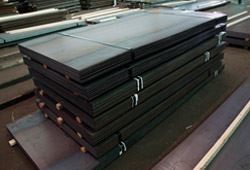
Carbon Steel Plate
Carbon Steel Plate - Specifications
- Product : Carbon Steel Plate
- Thickness : 0.01 ~ 200mm
- Width : 1000mm, 1219mm, 1500mm, 1800mm, 2000mm, 2500mm, 3000mm, 3500mm
- Length : 2000mm, 2440mm, 3000mm, 5800mm, 6000mm, etc
- Standards : JIS, AISI, ASME, ASTM, AMS, GB, DIN, EN, GOST
- Finishes : Surface finish of SS Plate: 2B, 2D, BA, NO.1, NO.4, NO.8, 8K, mirror, embossed, hair line, sand, blast, Brush, etching, etc

Trusted
Supplier

Genuine
Product

Easy
purchase
Carbon Steel Plate Specification Chart
Carbon Steel Plate Specification & Grades
| Product |
Carbon Steel Plate |
| Thickness |
0.4mm to 80mm |
| Length |
upto 18 meters |
| Width |
1000 to 4500mm |
| Surface: |
Protective coatings, grease, oil, mill scale and annealing |
| Manufacturer: |
POSCO, Aperam, Jindal Stainless, DKC Korea, Thyssenkrup, Baosteel, TISCO, Arcelor Mittal, VDM,
Nippon Metal, Outokumpu |
| Package |
Shrink-wrapped ,Carton boxes,Wooden pallets,Wooden boxes ,Wooden crates Etc.
required. |
| Grade |
| Carbon Steel
|
A36, A572 GR 50, A588 (Corten type), 1045, A516 GR 70, A514 T-1 |
Common grades of Carbon Steel Plates and their properties?
Common grades of Carbon Steel Plates encompass ASTM A36, which is universal in structural applications due to its excellent weldability and machinability. With a minimum yield strength of 36,000 psi (250 MPa), ASTM A36 plates are utilized in construction, bridges, and general structural frameworks. Another prevalent grade is ASTM A572, a high-strength, low-alloy structural steel offering enhanced strength and weldability over standard Carbon Steel Plates.
ASTM A572 plates, available in grades 50, 55, and 60, are often employed in structural projects like bridges, buildings, and construction machinery. These plates exhibit improved corrosion resistance and mechanical properties, making them suitable for demanding applications where strength and durability are paramount.
ASTM A514, characterized by its high yield strength, provides excellent weldability and toughness, favouring it in applications requiring resistance to impact and abrasion. Commonly used in construction and mining equipment, ASTM A514 plates feature high tensile strength and toughness, offering optimal performance in harsh operating environments.
ASTM A516 is renowned for its elevated temperature resistance and is commonly used in pressure vessel applications where elevated temperature and pressure conditions are prevalent. These grades of Carbon Steel Plates serve diverse industrial sectors, offering a balance of strength, weldability, and corrosion resistance to meet specific application requirements with reliability and efficiency.
Carbon Steel Plate Chemical Composition
Explore our accurate Carbon Steel Chemical Composition Chart, essesntial for diverse applications, with insights from a leading Carbon Steel Plate Supplier in Europe, ensuring adherence to quality standards and performance reliability.
Chemical Composition of Carbon Steel Plate
| Composition |
Percentage % |
Composition |
Percentage % |
| C |
0.18 |
Cu |
0.3 |
| Si |
0.4 |
Ni |
0.3 |
| Mn |
0.95/1.50 |
Mo |
0.08 |
| P |
0.015 |
Nb |
0.01 |
| S |
0.008 |
Ti |
0.03 |
| Al |
0.02 (Min) |
V |
0.02 |
| Cr |
0.3 |
- |
- |
Carbon Steel Plate Mechanical Properties
Discover the mechanical prowess of Carbon Steel Plates, including strength and ductility, provided by a prominent Carbon Steel Plate Manufacturer in Europe, ensuring top-tier quality for a range of industrial applications.
Mechanical Properties of Carbon Steel Plate
| Properties |
Value |
| Tensile strength (N/mm2) |
415/580 |
| Yield stress/ min (N/mm2) |
265 |
Best practices for preventing corrosion & rust in Carbon Steel Plates?
- Preventing corrosion and rust in Carbon Steel Plates involves implementing effective preventive measures and maintenance practices. One of the best practices is applying protective coatings to the surface of the Carbon Steel Plates. Various types of coatings, such as paints, epoxy coatings, and corrosion-resistant sealants, act as a barrier against the environment's moisture, oxygen, and corrosive substances.
- These coatings create a protective layer that shields the steel surface from corrosion and rust, prolonging the lifespan of the plates. Regular inspection and maintenance of the coatings are essential to promptly address any signs of damage or deterioration.
- Another important preventive measure is controlling the environmental conditions surrounding the Carbon Steel Plates. Minimizing exposure to moisture, humidity, and corrosive substances can help prevent corrosion and rust formation. Proper storage practices, such as storing the plates in a dry, well-ventilated environment, can reduce the risk of moisture buildup and corrosion.
- Maintaining proper drainage and avoiding water traps can prevent stagnant water from accumulating on the surface of the plates, further reducing the likelihood of corrosion. By implementing these preventive measures and maintenance practices, Carbon Steel Plates can maintain their integrity and durability, ensuring long-term performance in various industrial applications.
Carbon Steel Plate Size Chart
Explore our comprehensive Carbon Steel Plate Size Chart ensuring optimal performance and longevity. As a well-known Carbon Steel Plate Supplier in Europe, we provide detailed information for informed decision-making in various industrial applications.
Size Chart of Carbon Steel Plate
| Size (in mm) |
Size (in inches) |
| 3.40 |
0.134 |
| 3.18 |
0.125 |
| 4.75 |
0.187 |
| 3.96 |
0.156 |
| 7.92 |
0.312 |
| 6.35 |
0.250 |
| 12.7 |
0.500 |
| 9.53 |
0.375 |
| 15.9 |
0.600 |
| 22.2 |
0.875 |
| 19.1 |
0.750 |
| 25.4 |
1 |
| 76.2 |
3 |
| 31.8 |
1.250 |
| 28.6 |
1.125 |
| 38.1 |
1.500 |
| 50.8 |
2 |
| 44.5 |
1.750 |
| 63.5 |
2.500 |
Applications of Carbon Steel Plates in Europe
Carbon Steel Plates find widespread applications across diverse industries due to their durability, strength, and versatility. As a top Carbon Steel Plate Manufacturers in Europe, we deliver reliable solutions for heat exchange, and more, meeting diverse industrial needs with quality assurance.
- Carbon Steel Plates are extensively used in constructing buildings, bridges, highways, and other infrastructure projects throughout Europe. They provide the structural strength required to support heavy loads and withstand harsh environmental conditions, making them indispensable in the construction industry.
- Carbon Steel Plates are utilized in the manufacturing of automotive components and structures, including chassis, frames, body panels, and suspension systems. Their high strength and formability make them ideal for producing lightweight yet durable automotive parts, contributing to the production of safe and reliable vehicles.
- In the maritime industry, Carbon Steel Plates are employed to construct ships, offshore platforms, and marine equipment. These plates offer excellent weldability, corrosion resistance, and toughness, making them suitable for marine environments where vessels are exposed to saltwater, waves, and harsh weather conditions.
- Carbon Steel Plates play a vital role in the energy sector, particularly in constructing power plants, pipelines, and storage tanks. They are used to fabricate components that handle high-pressure and high-temperature environments, ensuring the reliable operation of energy infrastructure across Europe.
- Carbon Steel Plates find applications in various manufacturing processes and machinery, including agricultural equipment, industrial machinery, and mining machinery. Their versatility, machinability, and strength make them essential for fabricating components that endure heavy-duty operations in diverse industrial sectors.
Weight Chart of Carbon Steel Plate
As a trusted Carbon Steel Plate Manufacturer in Europe, we provide comprehensive weights information to facilitate accurate decision-making in various applications.
Carbon Steel Plate Weight Chart
| Thickness (inches) |
Density (lbs/in³8.72 g/cm³) |
DSS Plate Weight per Unit Area |
|
|
lbs/in² |
kg/m² |
| 3/16 |
0.315 |
0.06000 |
42.184176 |
| 1/4 |
0.315 |
0.08 |
56.245568 |
| 3/8 |
0.315 |
0.121 |
85.0714216 |
| 1/2 |
0.315 |
0.161 |
113.1942056 |
| 5/8 |
0.315 |
0.196 |
137.8016416 |
| 3/4 |
0.315 |
0.235 |
165.221356 |
| 7/8 |
0.315 |
0.274 |
192.6410704 |
| 1 |
0.315 |
0.313 |
220.0607848 |
| 1 1/4 |
0.315 |
0.391 |
274.9002136 |
| 1 1/2 |
0.315 |
0.47 |
330.442712 |
| 1 3/4 |
0.315 |
0.549 |
385.9852104 |
| 2 |
0.315 |
0.627 |
440.8246392 |
| 2 1/4 |
0.315 |
0.705 |
495.664068 |
| 2 1/2 |
0.315 |
0.784 |
551.2065664 |
| 2 3/4 |
0.315 |
0.862 |
606.0459952 |
| 3 |
0.315 |
0.941 |
661.5884936 |
Advantages of using Carbon Steel Plates
- Carbon Steel Plates are known for their exceptional strength and durability. They possess high tensile and yield strengths, making them suitable for withstanding heavy loads and harsh operating conditions.
- Carbon Steel Plates exhibit excellent impact resistance, making them ideal for applications where structural integrity is crucial, such as in construction, infrastructure, and machinery.
- Carbon Steel Plates are relatively affordable compared to other materials, contributing to cost-effectiveness in manufacturing and construction projects.
- Carbon steel is highly malleable and can be easily formed into various shapes and sizes, allowing for flexibility in design and manufacturing processes.
- Carbon Steel Plates can be welded, machined, and fabricated using conventional methods, making them accessible for a wide range of applications across different industries.
- Furthermore, Carbon Steel Plates can be surface-treated to enhance their corrosion resistance, further expanding their usability in corrosive environments. Overall, the combination of strength, affordability, versatility, and ease of fabrication makes Carbon Steel Plates a preferred choice for many industrial and commercial applications.
Various Types of Carbon Steel Plate We Supply
PipingProjects.eu is a leading Carbon Steel Plate Supplier in Europe. We supply different types of Carbon Steel Plates to meet diverse industrial needs with superior quality and precision.
Are Carbon Steel Plate suitable for high temperature applications?
- Carbon Steel Plates are generally suitable for high-temperature applications up to a certain threshold, depending on the specific grade and alloy composition. While carbon steel exhibits good strength and thermal conductivity, its performance under elevated temperatures can vary based on carbon content, alloying elements, and heat treatment.
- Carbon Steel Plates are commonly used in applications such as boilers, pressure vessels, and heat exchangers, where they are exposed to elevated temperatures and pressures. However, prolonged exposure to temperatures exceeding certain limits can lead to the degradation of mechanical properties, such as reduced tensile strength and increased susceptibility to creep deformation.
- Proper selection of grades and surface treatments is crucial to enhance the suitability of Carbon Steel Plates for high temperature applications. Low-carbon steel grades with added alloying elements such as chromium, molybdenum, and nickel exhibit improved high temperature strength and oxidation resistance.
- Additionally, surface treatments such as galvanizing or protective coatings can help mitigate corrosion and oxidation at elevated temperatures. While Carbon Steel Plates can be utilized in high-temperature environments, carefully considering operating conditions, alloy composition, and surface protection measures is necessary to ensure optimal performance and longevity of the plates in such applications.
Manufacturing Process of Carbon Steel Plates
Carbon Steel Plate is produced in seven steps. It manufactures a wide range of shapes, goods, and parts, ranging from Carbon Steel Plate and Coil.
- Step 1 : Raw Material Selection
To begin the process of creating alloy steel, raw materials such as iron ore and other elements including nickel, chromium, and molybdenum are carefully selected. The choice of alloying elements depends on the specific properties that the alloy steel is intended to possess.
- Step 2 : Smelting and Melting
Once the raw materials have been selected, they are smelted in a furnace to create a molten metal alloy. The composition of the alloy is closely monitored and controlled to achieve the desired grade of alloy steel.
- Step 3 : Forming
After the molten alloy steel has been produced, it is cast into different shapes and forms, depending on its intended use. The most common shapes include slabs, billets, blooms, or ingots.
- Step 4 : Primary & Secondary Steelmaking
The subsequent step is primary steelmaking, which can be accomplished through different methods such as the Basic Oxygen Furnace (BOF) or the Electric Arc Furnace (EAF). At this stage, impurities like carbon are eliminated to achieve the desired chemical composition.
- Step 5 : Casting
The molten alloy steel is then cast into semi-finished forms, which can take the shape of plates, sheets, bars, or other forms. Continuous casting or ingot casting methods are usually employed for this purpose.
- Step 6 : Hot Rolling
In the case of products like Carbon Steel Plates, the semi-finished castings are hot-rolled to achieve the desired thickness and shape. During this process, the thickness of the castings is reduced while improving their mechanical properties.
- Step 7 : Cold Rolling and Annealing
In the case of specific alloy steel products such as thin sheets and coils, cold rolling is employed to further reduce the thickness and enhance surface finish. To relieve stresses and enhance corrosion resistance, annealing is frequently performed.
